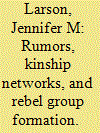| Srl | Item |
| 1 |
ID:
162516


|
|
|
|
|
| Summary/Abstract |
While rumors predominate in conflict settings, researchers have not identified whether and why they influence the start of organized armed conflict. In this paper, we advance a new conceptualization of initial rebel group formation that aims to do so. We present a simple game-theoretic network model to show why the structure of trusted communication networks among civilians where rebel groups form—which carry credible rumors about the rebels—can influence whether incipient rebels become viable. We argue further that in rural Sub-Saharan Africa, kinship network structures favorable to nascent rebels often underlie ethnically homogeneous localities, but not heterogeneous ones. In doing so, we advance a new explanation for why ethnicity influences conflict onset, and show why ethnic grievances may not be a necessary condition for the emergence of “ethnic rebellion.” We illustrate our arguments using new evidence from Uganda that provides a rare window into rebel group formation.
|
|
|
|
|
|
|
|
|
|
|
|
|
|
|
|
| 2 |
ID:
155597


|
|
|
|
|
| Summary/Abstract |
Settlers flocking to boomtowns on the American western frontier were faced with the same task that communities in weak states across the globe face in contemporary times: self-governance. Peer sanctions can enforce cooperation in these environments, but their efficacy depends on the social networks that transmit information from peer to peer. The author uses a game-theoretic model to show that peripheral network positions can generate such strong incentives to misbehave that persistent cheating occurs in equilibrium. The model reveals that groups maintaining high levels of cooperation that face shocks to their strategic environment or to their network can ratchet down into less cooperative equilibria in which the most peripheral become ostracized. Furthermore, population change that features rapid growth, high turnover, and enclave settlements can undermine cooperation. The insights from this article help to explain the trajectory of cooperation in the mining towns of the Wild West in which high levels of cooperation deteriorated as the population surged, and help to make sense of why only certain nonwhite settlers were targets of hostility and racism.
|
|
|
|
|
|
|
|
|
|
|
|
|
|
|
|